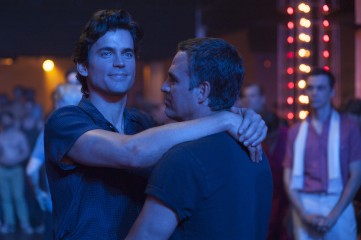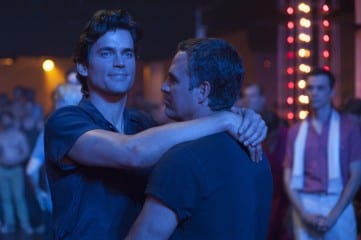
Matt Bomer and Mark Ruffalo in ‘The Normal Heart,’ which debuts Sunday on HBO.
In the early 1990s, the AIDS crisis and gay rights became a suitable subject for popular entertainment, with movies and TV shows like Longtime Companion, Philadelphia, And the Band Played On, Tales of the City and plays like As Is, Angels in America and Larry Kramer’s The Normal Heart. The last one, coming from the most vocal (and often least well-liked) voice of the gay activist movement, was probably the most polarizing. It never had a Broadway opening, and certainly was not adapted for the screen.
By 2012, the world was ready again to deal with Larry Kramer. The play opened on Broadway (and won a Tony), and now — about two decades after the artistic fever-dream of AIDS dramas — the filmed version hits the airwaves.
HBO’s The Normal Heart has been a long time coming, but in some ways, it feels like it didn’t skip a beat. The opening segment, a trip to Fire Island cribbed from the structure of Longtime Companion, is both familiar and new, what with all the full-frontal nudity and explicit sex you wouldn’t have seen 20 years ago. And even better, many, many openly-gay actors in the major roles (among them: Matt Bomer, Jim Parsons, Jonathan Groff, Stephen Spinella and B.D. Wong). Not gay, but going full-bore as the hero anyway, is Mark Ruffalo as Ned Weeks, Kramer’s stand-in for himself. Ned’s something of a Cassandra, clucking his disapproval at sexual freedom (or is it recklessness?) even before there’s any indication of the coming plague.
Ned meets a doctor (Julia Roberts), who is even more of a downer than he is, insisting that gay sex is killing men and getting them to stop is the only course of action. But “promiscuity is the principal political agenda” of the gay movement in 1981, Ned argues — you can’t just get them to stop. And yet, you have to. To fail is to accede to genocide.
I’m sure The Normal Heart will shock a lot of mainstream sensibilities, and even some disdainful gays who think it both negatively portrays gay stereotypes and glamorizes anonymous sex. But you can’t have it both ways — you can’t complain about its authenticity and chastise it for being too accurate. But HBO made the formula work one year ago, with its equally shocking biopic about Liberace, Behind the Candelabra, and it won every award in the book. There’s no reason to think lightning won’t strike twice.
The weakness of the play (and now the screenplay, also by Kramer) is the character of Ned, who is so impassioned yet unlikeable that you can’t stand how he’s both right and gets in the way of getting the right thing done. In some ways, it takes amazing self-possession for Kramer to portray his alter ego warts and all, while balancing the competing issues sex-as-liberation and sex-as-death. It was equally hard for the gay community in its day.
But what sustains such competing currents is the emotional tremors the story sets off, which start nearly at the start and rarely waver for the next two hours. The first appearance of a character with Kaposi’s sarcoma … the first realization a seemingly healthy, young, blossoming young man is infected and will die … the first closeted person who could make a difference cowering out of fear of the social stigma … well, even if you did not live through those days, you can’t help but feel rattled. And it leaves you feeling that way.
That’s a ravaging effect of a movie, that sincere, wet-eyed shiver of the inevitable horror faced by a generation of gay men. Director Ryan Murphy (Glee) never lets up. He doesn’t want you to relax. You might miss the urgency, a feeling of self-preservation that, since the invention of the AIDS cocktail, hasn’t been as pressing in society, even the gay community. In many ways, this is the perfect symbiosis of Kramer and Murphy: The radical and the populist. Indeed, if it weren’t already widely known as The Normal Heart, I know the perfect title for it: American Horror Story.

